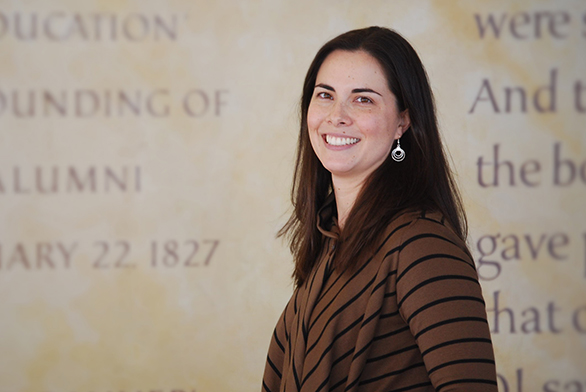Graduate Student Leads a Life of Service
Spring 2016 | By Robin Weiss for The College

After deployments in Iraq, Afghanistan, and a U.N. peacekeeping mission during the peak of the Ebola crisis in Liberia, 30-year-old Captain Erinn Woodside (AGI) finds that civilian life, “sitting at a desk,” makes her antsy. Raised in a Navy family, Woodside and her two siblings were homeschooled by their mother. At age 10, inspired by her grandmother’s work on the Atlas Rocket Program, Woodside savored what she calls “astronaut dreams.”
The science curriculum and discipline of a service academy initially drew Woodside to the United States Air Force Academy, where she graduated in 2008. “It was the best and worst time of my adult life,” says Woodside, who found the “very mechanical, lecture based” teaching methods disappointing. As one of the 15 percent of women among four thousand cadets, she endured teasing and insults. But “living daily with nasty jokes makes you tough,” she says, and the whole program, “designed to keep you stressed, as a constant state,” was excellent preparation for deployments.
When cyber warfare was relatively new, her first assignment, as a communications officer in San Antonio, trained her in cyber development. Two years later, Woodside volunteered to serve in Iraq and arrived at Camp Victory Base, a city of fifty thousand within Bagdad, between two campaigns: Iraqi Freedom and Operation New Dawn. As platoon leader, working 12 to 18 hours a day with her soldiers in a signals battalion, she recalls her experience as both wonderful and awful.
Woodside made time to engage with 65 Iraqi girls, ages 4 to 15, from on and off base, in a popular scouts-like program. However, two weeks before leaving Iraq, she sustained a percussive brain injury from a rocket bomb. “We call it ‘getting blown up’,” she says. Though tests found no brain bleeding, cognitive problems affecting memory and attention plagued her for years. Firefighter friends took her in and cared for her, until she was flown back to Texas for months of medical hold.
During her next assignment in Fort Meade, Maryland, Woodside, dismissing her injury, volunteered for Afghanistan, just nine months after returning from Iraq. She loved what she calls “the clarity of mission.” But despite the rewards of working off base 18 hours a day, seven days a week, she could no longer ignore her symptoms from the blast.
Back at Fort Meade in fall 2012, Woodside received intensive medical attention at Walter Reed Hospital. Neurological exams revealed lesions consistent with blast damage; she was diagnosed with a mild traumatic brain injury. She learned that overwhelming guilt and denial are common symptoms following trauma. Without a missing limb or bullet wound, “I felt I was taking resources away from others,” she says. Woodside received a Purple Heart, the military decoration awarded to soldiers wounded or killed while serving.
In summer 2014, after hearing an ad on NPR, Woodside applied and jumped into the Graduate Institute while still an active duty officer. Three GI segments later, she volunteered to serve in Liberia. “It’s one of the poorest countries in the world, just this side of a failed state,” she says, noting that it has only five paved roads and little to no hydro and electrical infrastructure. She felt welcomed as the only woman in her “truly global” team, representing at least 10 countries and five religions. With “no touching, no physical contact,” they tracked the spread of Ebola, while living alongside, interviewing, and educating locals.
In her fourth GI segment, Woodside values “the soft skills” gained from the St. John’s curriculum. “The heart of the program, to suspend pre-conceived notions and look at something from a different perspective, to withhold judgment” creates, for her, “a similar mindset to deployment. The openness of mind that the program fosters produced the very skills I needed in Liberia and elsewhere.” She tolerates no excuses for fear-based ignorance, and loves to shatter stereotypes. “If there is one thing I’ve learned, both in the world and at St. John’s, it’s that there is so much gray.”

